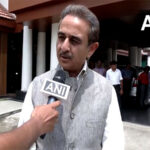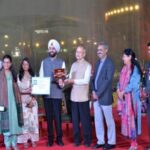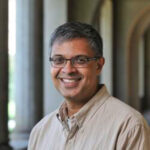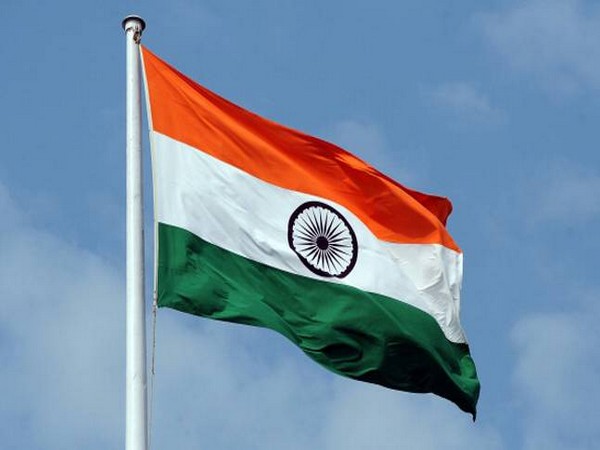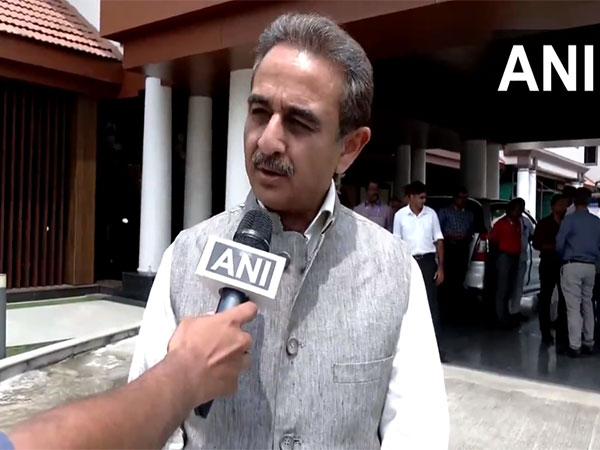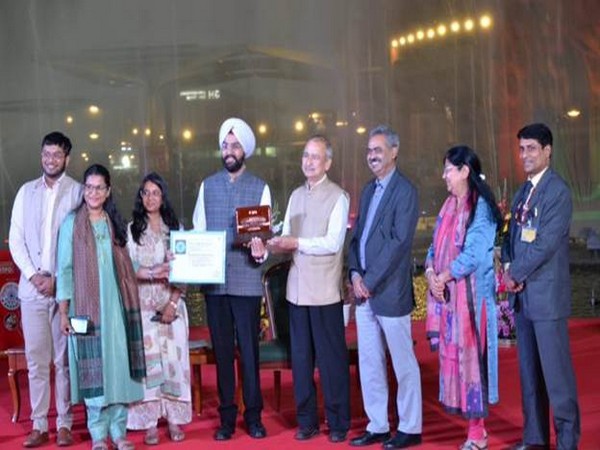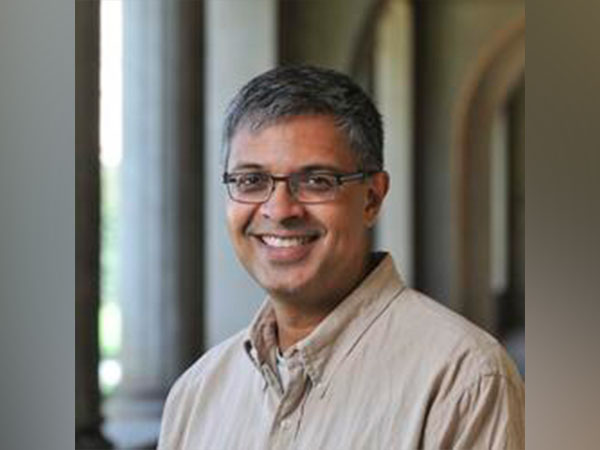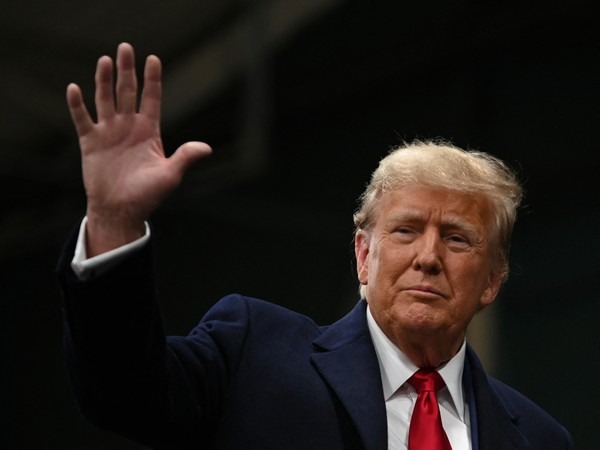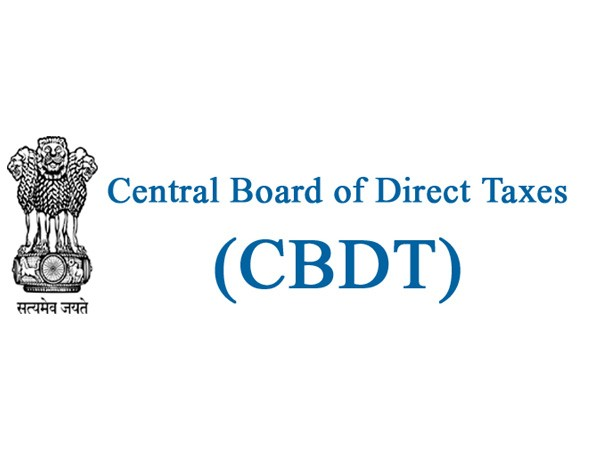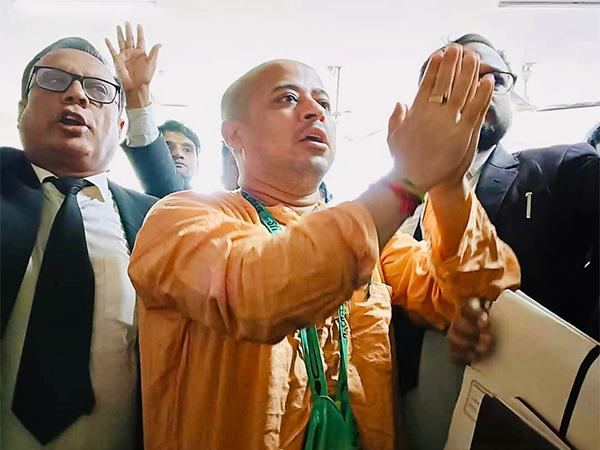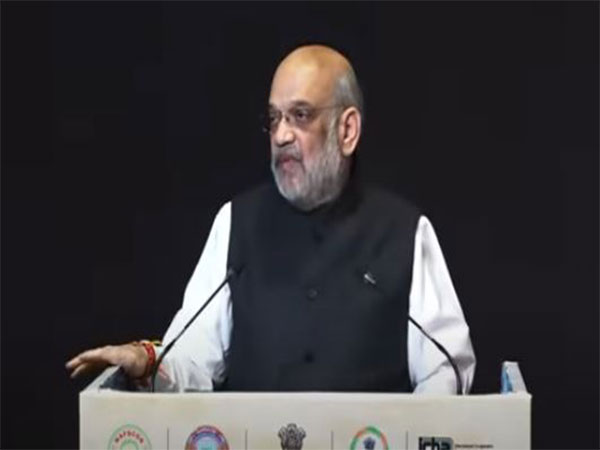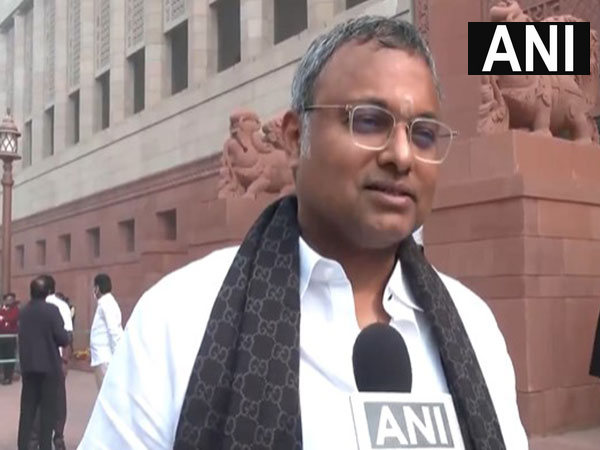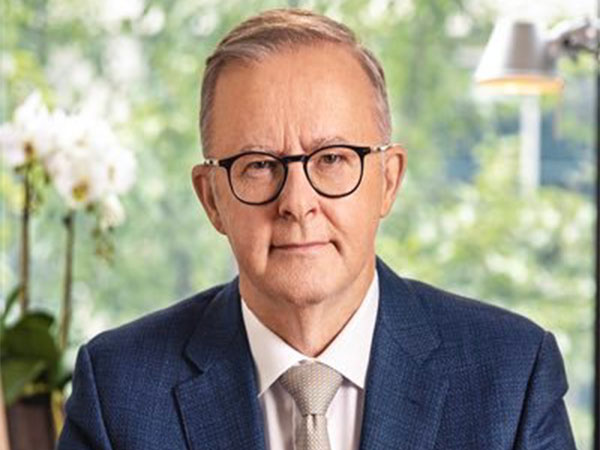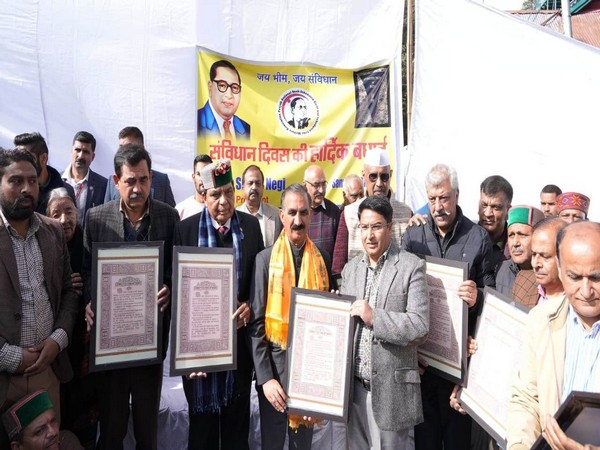
Shimla (Himachal Pradesh) [India], November 26 (ANI): Himachal Pradesh Chief Minister Sukhvinder Singh Sukhu on Sunday paid floral tributes to the statue of BR Ambedkar, Chairman of the drafting committee of the Indian Constitution, at Chaura Maidan, Shimla on the occasion of Constitution Day.
On this occasion, while addressing the program organized by the Congress Party Scheduled Caste Department and Bhim Rao Ambedkar Welfare Society, Chief Minister Sukhu said that this day is celebrated in India on November 26 annually to commemorate the adoption of the Constitution of India. On 26th November 1949, the Constitutional Assembly of India adopted the Constitution of India, which came into effect on January 26, 1950.
“Ambedkar was the architect of the Constitution of India who contributed to promoting social harmony and equality. He worked throughout his life for the welfare and rights of the backward sections of society and the poor,” CM Sukhu said. He said that the Constitution Day program would be organized as a state function from next year.
While interacting with media persons the Chief Minister said that the state government was committed to providing quality education to the students in the state. He said that the state government was going to make comprehensive reforms in the field of education from the upcoming academic session and it has also been decided to provide education in English medium from the first class in the schools.
The state government was also going to launch a guest faculty teachers policy to overcome the shortage of teachers, he added. The Chief Minister also administered the oath of allegiance to the Constitution to the people present at the function. (ANI)
Ministry of Law and Justice in collaboration with Indian Law Institute celebrates Constitution Day
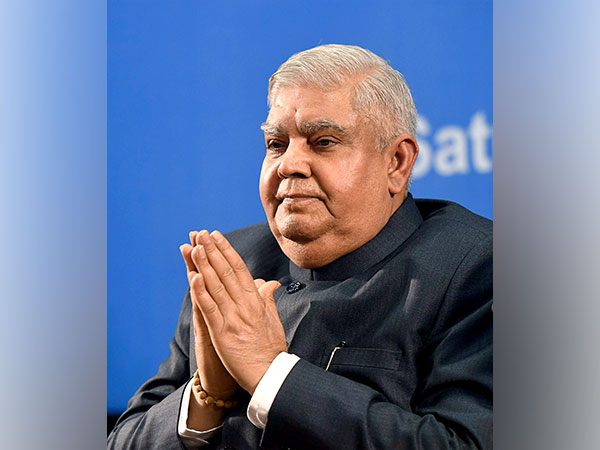
New Delhi [India], November 26 (ANI): The Ministry of Law and Justice, in collaboration with Indian Law Institute celebrated Constitution Day on Sunday at Vigyan Bhavan in the national capital in an impressive ceremony befitting the occasion. It was on this day in 1949, that the people of India adopted the Constitution.
Vice President Jagdeep Dhankhar graced the occasion as the Chief Guest and delivered the keynote address. The event began with the traditional lighting of the lamp by the dignitaries on the stage. This was followed by the release of two books published by the Ministry of Law and Justice and Indian Law Institute titled ‘ A Guide to Alternative Dispute Resolution’ and ‘Perspectives on Constitution and Development’ respectively.
‘A Guide to Alternative Dispute Resolution’ is an endeavour by the Department of Legal Affairs to enable the common citizens of the country to understand the framework of arbitration and mediation existing in India. It is a publication that would be a ready reckoner for comprehending the benefits and advantages of these mechanisms for timely, cost-effective and efficacious dispute resolution.
The second book, ‘Perspectives on Constitution and Development’, is a compilation of articles and lectures delivered by eminent academicians and scholars as a part of a lecture series organised to mark the 75th anniversary of India’s independence. The book contains insightful reflections of illustrious academicians and jurists about the constitutional democratic set-up of India, its work over the years and the challenges and possibilities of reform.
Welcoming the gathering Dr Niten Chandra, Secretary, Department of Legal Affairs, Government of India said that today was a day of celebration, of commemorating a great achievement, an occasion to remind ourselves of the team spirit and dedication of our Constitution makers, who were faced with many challenges at that point of time. He said we had a legacy of foreign rule and our Constitution helped us have an agenda of a free nation.
Tushar Mehta, Solicitor General of India said that any Constitution to fulfil its objectives has to have a long-term vision. He said that the resilience of the Indian Constitution can be appreciated from the fact that while many newly independent nations that got their Constitutions almost at the same time as ours faced turmoil, ours has stood the test of time and emerged stronger as the makers of our Constitution could foresee all these challenges.
Justice Ritu Raj Awasthi, Chairperson of the Law Commission said that our Constitution did not manifest in one single day but is the result of a long struggle that dates back to centuries. Justice Indira Banerjee, Former Judge Supreme Court of India, said that our Constitution is people-centric and is a testament to egalitarianism and gender empowerment. She spoke about the need to uphold the values and philosophies enshrined in our Constitution.
Addressing the gathering, Justice Arun Kumar Mishra, Chairperson of NHRC said the Constitutional provisions operate to improve the life of an individual and aim at the collective well-being of all. It is a document against arbitrariness and ensures equality and a dignified life for all. Speaking on the occasion Arjun Ram Meghwal warmly conveyed his best wishes to the gathering on the momentous occasion of Constitution Day.
He said since the Constitution enters the 75th year it was an even more significant day as Amrit Varsh. He named various Constituent assembly members, who were well known and distinguished, and he said we should remember and revere them on this day for their valuable contribution in the making of the Constitution. The Minister also paid tributes to the far sightedness of Dr BR Ambedkar for giving the right to franchise in the Constitution to women at its inception, while many developed countries took years to confer this right, after much struggle.
In his keynote address, the Chief Guest, the Dhankhar said India’s growth story in the field of economy, science and technology and its pre-eminence in the comity of nations reflects our Constitutional strength. “Our Constitution has given us an ecosystem where everyone can develop and aspire to see the fruition of one’s talent. The affirmative actions provided in the Constitution have assured the transformation of India and now it is poised to be the third-largest economy in the world,” he added.
The Vice President also appreciated recent judicial reforms and modernization, which has made the judiciary more accessible to all. He added that for the growth of the nation and the successful running of the Constitution, all three pillars – the Legislature, the executive and the judiciary must have a collaborative approach and convergence of attitude.
The dignitaries also gave away awards to winners of the debate on the theme ‘Limits to Liberty – Fundamental Rights vs Fundamental Duties’ organised by the Ministry for students of national law universities in collaboration with the Indian Law Institute, on the eve of Constitution Day. Maanasi Pilla and Nandini Kaushik from Bennett university won the first prize in the debate, Tejaswini Satheesh and Pratham Pedaparthi from India IIULER, Goa won the second prize and placed third were Prerna Cheema and Divyanshu Goel from Punjab university. The first prize was a cash award of Rs 50,000, the second prize winner received Rs 30,000, while the third prize winner got Rs 20,000 as award money. The Best speaker in the individual category, Shirsho Ghosh, NUJS, West Bengal, was given a cash prize Rs 10,000.
As part of the celebrations this year, a national level transformative Colloquium was also organised featuring five technical sessions from 2 p.m. to 4 p.m. The objective of the Colloquium was to explore the crucial link between constitutional values, global aspirations, with the well-being of the planet and its inhabitants.
The first technical session titled ‘Accelerating Progress through the Constitutional Roadmap for Justice and Development’, was chaired by Justice Arun Kumar Mishra, Chairperson NHRC. The other participants were senior officers from the Department of Justice, Revenue, Agriculture and Farmers welfare, and Ministry of Corporate affairs, as well as a member from the Law Commission of India.
The second technical session was on ‘Climate Change and Constitutional Response’. It was chaired by Justice Sudhir Agarwal, Judicial Member, National Green Tribunal. The other participants were senior officials from the Ministry of Environment, Forests and Climate Change, Drinking Water and Sanitation, Housing and Urban Affairs, New and Renewable Energy, and Power, as well as a member from the Law Commission of India.
The third technical session was on ‘Law, Innovation and Technological Transformation’. It was chaired by Justice Vipin Sanghi, Former Chief Justice, High Court of Uttarakhand. The other participants were senior officers from the Ministry of Home Affairs, Electronics and IT, Civil Aviation, Department of Administrative Reforms and Public Grievances, as well as Chairman, Railway Board.
The fourth technical session was titled ‘Gender Empowerment within the Constitutional Scheme’. It was chaired by Justice Indira Banerjee, Former Judge, Supreme Court of India. Senior officers from the Ministry of Women and Child Development, Panchayati Raj, Rural Development, Legislative dept. and member of Law Commission of India.
The fifth session was on ‘Law and Justice in a Globalised world’. It was chaired by Justice Dipak Mishra, Former Chief Justice of India, CEO NitiAayog and senior officers from the Departments of Economic Affairs, Dept of Commerce and Promotion of Industry and Internal Trade. (ANI)

